Tokenised Securities - Thinking Outside the Box

Blockchain technology has brought about many new financial instruments, with security tokens being one of the most promising. These tokens allow for the digital representation of real-world securities, such as stocks, bonds, or real estate, and provide a more efficient, transparent, and accessible way to trade them. While Black Tie Digital continues to help expand blockchain technology into the real estate market in Australia and beyond, there are also a wide range of novel use cases and forward-thinking companies who are helping to grow the tokenised securities space in inventive and powerful ways.
- Tokenised Debt
Tokenised debt refers to the creation of digital tokens that represent ownership of a debt instrument, such as a bond or a loan. These tokens can be easily traded on a blockchain-based platform, providing investors with greater liquidity and flexibility than traditional debt instruments.
Tokenised debt has many advantages. It provides issuers with a more efficient and cost-effective way to raise capital, as it eliminates the need for intermediaries such as banks or brokers. It also provides investors with greater transparency and security, as ownership of the debt is recorded on a blockchain-based platform. In addition, it allows for more efficient and seamless settlement of transactions.
Tokenised debt has already gained traction in the financial industry, with many banks and financial institutions exploring the use of security tokens for debt issuance. In fact, it was only in 2019 that the World Bank issued the world's first bond to be created, allocated, transferred, and managed using only blockchain technology. More recently, EU-based DEFYCA announced plans to release their tokenised debt protocol on Avalance by July, under Europe's new and fairly comprehensive crypto regulatory framwork known as MiCA.
- Tokenised Royalties and Revenue Sharing
Tokenised royalties and revenue sharing involve creating digital tokens that represent ownership of a portion of the revenue generated by a particular asset or business. For example, a company could issue tokens that represent ownership of a percentage of the revenue generated by a particular product or service.
This use case has many advantages. It provides investors with a more direct and transparent way to participate in the success of a particular asset or business. It also provides issuers with a more efficient way to raise capital, as they don't have to give up ownership or control of the asset or business. In addition, it allows for a more flexible and customizable way to structure investment opportunities.
This use case has already been explored in the entertainment industry, with companies such as Royalty Exchange offering a platform for buying and selling music royalties as digital tokens. Other players are quickly entering into the space as well, with 360X Music AG partnering with government-mandated collecing society and performance rights organisation GEMA in Germany to tokenise royalties from film scores and pieces by composer Hans Günter Wagener, while over in France Talium Assets have sought to pioneer RTOs, or Royalty Token Offerings.
- Tokenised Litigation
Tokenised litigation is a novel use case for security tokens that involves creating digital tokens that represent ownership of a portion of a potential lawsuit settlement. This means that investors can purchase tokens that represent ownership of a portion of the potential payout from a lawsuit, providing a new way to finance legal action. Since being pioneered in a case against a Californian county in 2021, the novel industry has continued to grow steadily.
This use case has many advantages. It provides a more efficient way to finance litigation, as it allows for the sharing of legal fees and reduces the burden on the plaintiff. It also provides investors with a new investment opportunity, with the potential for high returns if the lawsuit is successful.
Tokenised litigation is still in its early stages, but several startups are already exploring this use case. For example, Liti Capital SA has created a platform that allows individuals and businesses to crowdfund legal action by purchasing digital tokens that represent ownership of a portion of the potential payout from a lawsuit.
In conclusion, security tokens have the potential to revolutionize the way we think about securities and investments. One of the most exciting potential outcomes from this increase in accessibility is what we at Black Tie Digital have termed 'the democratisation of opportunity'. However, it should be noted that less tangible but no less important outcomes should rise concurrently - namely, an increase in the overall level of education and awareness from the general population about what investment opportunities are actually out there and available.
Before the rise of blockchain technology, these forms of investment were rare and obscure mechanisms, generally only available to skilled and specialised investors. Thanks to tokenisation, we can expect a significant uptick in both adoption and awareness, bringing not only financial opportunity but also a chance for everyday investors to support the platforms, movements, artists and more that they believe in.
As the technology continues to evolve and mature, we can expect to see even more exciting use cases emerge in the years to come - so watch this space (or let us watch it for you!).

%20(2).png)
